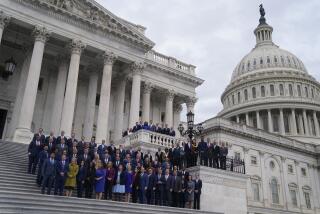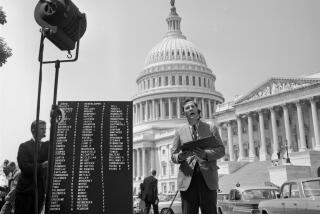Column: Why Does Standard July Fourth Oratory Bug Most Chicanos?
A small group of Chicanos sat before a TV the Fourth of July to watch Honor America Day for the explicit reason of trying to determine why such events could bug them.
How could a show honoring the Flag, God and country offend any American? The Chicanos knew they had tackled a tough one and that any answer to the nagging question could be easily misinterpreted.
But being that they were merely indulging in mental and emotional calisthenics they tackled the job with alacrity.
The trouble with such patriot bashes as Honor America Day, the Chicanos decided, is that they tend to dehumanize the Flag, monopolize God and abuse the word America.
For too long the American Flag, the Chicanos agreed, has been the symbol of those who insist that property rights are more important than human rights.
Fourth of July oratory, the Chicanos noted, tends to paint God as a super American who has blessed the country with its great wealth and power because right thinking people—like those who attend Honor America Day celebrations and wave the Flag vigorously—run the place.
But the thing that bugged the Chicanos the most was that the United States is called America, as if that name belonged exclusively to Anglo United States.
All this spelled one thing to the Chicanos: our system insists on Anglicization.
Most Anglos, the Chicanos decided, are unconscious of this and so cannot comprehend why Honor America Day could offend any “good American.”
After watching Honor America Day and making their comments the small group of Chicanos unwound and had a good Fourth of July, just like many other Americans.
The thing to remember, however, is that this small group of Chicanos voiced the thinking of a significant part of the Chicano movement. Chicanos are resisting Anglicization.
UCLA’s Mexican-American Cultural Center has just released the first issue of a “Chicano Journal of the Social Sciences and the Arts.” The journal is called Aztlan for the Mexican Indian word which describes the Southwestern part of this continent which includes the five U.S. Southwestern states and Northern Mexico.
Chicanos explain that they are indigenous to Aztlan and do not relate, at least intellectually and emotionally, to the Anglo United States.
The journal, written by Chicano university scholars, starts off with the “Spiritual Plan of Aztlan” which was adopted by the Chicano Youth Liberation Conference held in Denver in March 1969.
The wording of the “plan” may shed some light for those wishing to understand the Chicano movement:
“In the spirit of a new people that is conscious not only of its proud historical heritage, but also of the brutal ‘gringo’ invasion of our territories, we, the Chicano inhabitants and civilizers of the northern land of Aztlan, from whence came our forefathers, reclaiming the land of their birth and consecrating the determination of our people of the sun, declare that the call of our blood is our power, our responsibility, and our inevitable destiny.
“We are free and sovereign to determine those tasks which are justly called for by our house, our land, the sweat of our brows and by our hearts. Aztlan belongs to those that plant the seeds, water the fields, and gather the crops, and not to the foreign Europeans. We do not recognize capricious frontiers on the bronze continent.
“Brotherhood unites us, and love for our brothers makes us a people whose time has come and who struggles against the foreigner ‘gabacho’ (white) who exploits our riches and destroys our culture. With our heart in our hands and our hands in the soil, we declare the independence of our mestizo nation. We are a bronze people with a bronze culture. Before the world, before all of North America, before all our brothers in the bronze continent, we are a nation, we are a union of free pueblos, we are Aztlan.”
Whether we like it or not Fourth of July Americanism is in disrepute among minorities because they can’t seem to relate to it.
Singer Joan Baez, who is part Chicana, recently said that the defense of country, as used in Fourth of July oratory, “has absolutely nothing to do with the defense of people.” She continued:
“Once we get rid of the obsession with defending one’s country, we will begin defending life ... That’s why I hate flags. I despite any flag, not just the American Flag. It’s a symbol of a piece of land that’s considered more important than the human lives on it ...”
Whether we agree or not, it behooves us to revamp our Fourth of July oratory to relate to people instead of to fixed ideas that apparently are not working.
More to Read
Sign up for Essential California
The most important California stories and recommendations in your inbox every morning.
You may occasionally receive promotional content from the Los Angeles Times.











